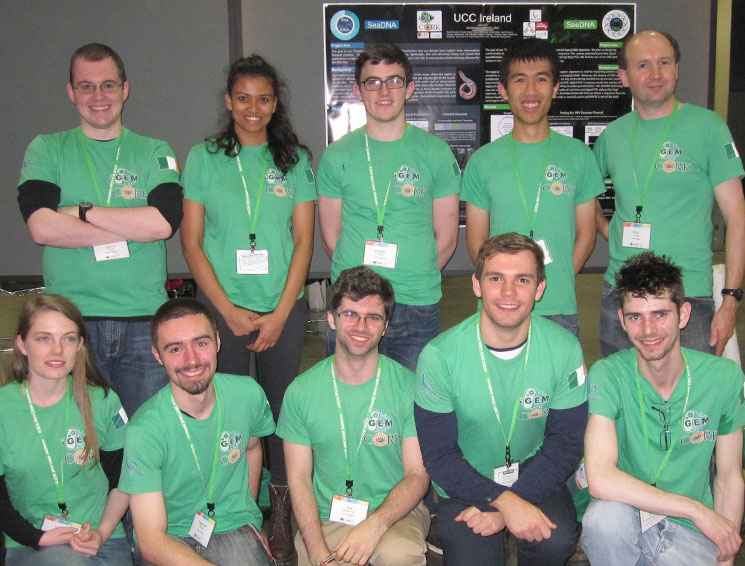Our News
UCC students are the first Irish team to compete in iGEM competition

Nine students from UCC were the first Irish team to participate in a prestigious synthetic biology competition held in Boston, USA from Oct 31st – Nov 3rd. The International Genetically Engineered Machine (iGEM) competition saw 245 teams from leading universities all over the world compete based on a synthetic biology research projects conducted over the summer.

Synthetic biology is a new an exciting field and has been defined as “the engineering of biology: the synthesis of complex, biologically based (or inspired) systems, which display functions that do not exist in nature” (Synthetic Biology: Applying Engineering to Biology: Report of a NEST High Level Expert Group). Among other things, synthetic biologists strive to use biological systems to produce fuels, chemicals, medicines and other useful materials.
The title of the UCC team’s submission to the iGEM competition was “SeaDNA and SeeDNA”. It was actually not just one project but two. Both projects were conceived by the students themselves and were outrageously successful. They were carried out under the guidance of Dr Paul Young and Professor Tommie McCarthy in the School of Biochemistry and Cell Biology at UCC.

The first project, SeaDNA, takes inspiration from the hagfish, which lives on the ocean floor and produces a defensive slime made of filaments with amazing properties. The team used bacteria to mass-produce two hagfish proteins and assembled them into synthetic fibres. These novel biopolymers are biodegradable, lightweight and thin, but potentially stronger than nylon, steel and even Kevlar. They have many potential applications in the biomedical, food and manufacturing industries.
The second project, SeeDNA, involved engineering bacteria to detect specific DNA sequences. As proof-of-principle, a bacterial system was developed for the detection of the human papilloma virus that causes cervical cancer. With further optimization this method could represent an ultra-low cost diagnostic technology for use in resource-poor hospital labs in developing countries or in agricultural and industrial settings.
While in Boston, the team presented their work in front of a large audience including the competition judges. They also prepared a poster and presented this throughout the 4-day competition. In addition, as part of the competition, the students had to create a wiki documenting their project. The wiki provides further details about the team and their projects and can be viewed here:http://2014.igem.org/Team:UCC_Ireland
The interdisciplinary team comprised students from across the College of Science, Engineering and Food Science. They received financial support from the UCC as well as from SOSventures, Eli Lilly and Janssen. They competed in the Entrepreneurship track of the competition and while they did not win any prizes, they hope to build on the experience gained this year to be much more competitive next year.
 The UCC iGEM 2014 team preparing to deliver their presentation at the iGEM Gaint Jamboree, in Boston.
The UCC iGEM 2014 team preparing to deliver their presentation at the iGEM Gaint Jamboree, in Boston.

UCC iGEM 2014 team member Patrick Xie (left) examining an LED-based illumination device made by the Alto_Helsinki team from Finland
UCC iGEM 2014 team member Patrick Xie (left) examining an LED-based illumination device made by the Alto_Helsinki team from Finland

The UCC iGEM 2014 team pictured after their presentation together with the other teams in the Entrepreneurship track – Alto_Helsinki from Finland and the eventual winners of the track ITESM_Guadalajara from Mexico
The UCC iGEM 2014 team pictured after their presentation together with the other teams in the Entrepreneurship track – Alto_Helsinki from Finland and the eventual winners of the track ITESM_Guadalajara from Mexico

UCC iGEM 2014 team members Leanne O'Sullivan and Timothy O'Flynn explaining the team project during the poster session at the iGEM Gaint Jamboree, in Boston
UCC iGEM 2014 team members Leanne O'Sullivan and Timothy O'Flynn explaining the team project during the poster session at the iGEM Gaint Jamboree, in Boston
How did the students find the iGEM experience?
“iGEM was hard work, rewarding and enlightening” says Timothy O’Flynn (4th year Genetics). “Despite all the hard work that was required over the summer, the end result was worth it. We met some incredible people along the way and saw some amazing projects while in Boston.”
Ian McDermott (4th year Biochemistry) says “iGEM is not like other summer research projects - nobody tells you what to do or how to do it, the students are in charge.” Regarding the iGEM “Giant Jamboree” in Boston he says, “We met other students from around the world and bonded over our shared experiences. The iGEM Jamboree is a social experience as much as a scientific and educational one. I learned two very important lessons working on our iGEM project. The first was how to work as a part of a team without murdering my teammates. The second was that I want to work in research.”
Shama Chilakwad (4th year Genetics) says “iGEM in a nutshell: Being a part of a team, coming up with your own projects, designing the lab work, applying for funding, carrying out the lab work, compiling all the data, finishing up with a hopefully successful project, practicing presentations all in 3 months, And then you go to Boston and attend the world's largest synthetic biology event and present your work and get to meet literally thousands of people that did the exact same thing as you...that's quite a fantastic experience!”
Gavin King (4th year Biochemistry) says “iGEM is a fantastic opportunity to gain an insight into research.”
iGEM in 3 words...
Timothy O’Flynn (4th year Genetics): Hard work, rewarding, enlightening!
Ian McDermott (4th year Biochemistry): Hooked For Life!
Gavin King (4th year Biochemistry): Innovative, valuable, student-led
Shama Chilakwad (4th year Genetics): Challenging, motivating, rewarding
For more information, please contact Dr Paul Young. +353 (0) 21 420 5994.
